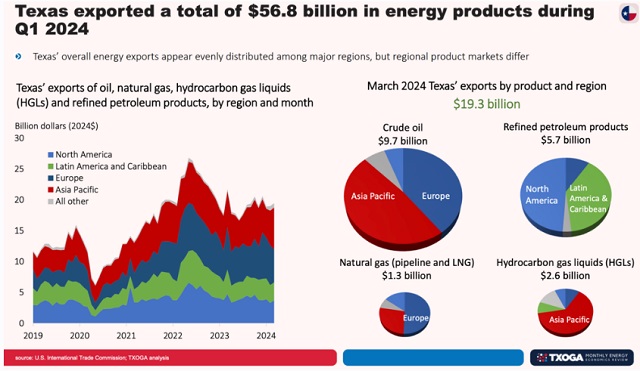Energy
Texas oil and natural gas industry continues to break records

From The Center Square
By
Texas’ oil and natural gas industry broke new production records in May, continuing a trend in recent months and years.
Texas’ production of oil, natural gas, and natural gas liquids (NGLs), refinery activity and exports reached new record highs last month, according to a new analysis published by the Texas Oil & Gas Association (TXOGA).
The industry produced a record-high 5.7 million barrels per day (mb/d) of crude oil in Texas, a record 32.5 billion cubic feet per day (bcf/d) of natural gas marketed production and 3.5 mb/d of NGLs, according to estimates made by TXOGA’s Chief Economist Dean Foreman, Ph.D.
This is after the Texas oil and natural gas industry established new monthly records in March, according to U.S. Energy Information Administration (EIA) and U.S. International Trade Commission data. In March, Texas reported a record-high NGL field production of 3.7 million mb/d – the highest on record in history – more than doubling in-state consumption, according to the data.
Crude oil production topped 5.6 mb/d; natural gas marketed production topped 32.3 bcf/d. Texas refinery activities also reach a record-high net production of 5.5 mb/d.
Texas’ production of oil and natural gas is unparalleled. No other state is producing the volume that Texas is.
This is after Texas’ petroleum products exports exceeded 4 million barrels per day for the first time in history last December.
Since then, the Texas oil and natural gas industry has sustained five consecutive months of exporting petroleum products of more than 4 million barrels per day. In the first quarter of 2024, Texas exported nearly $57 billion worth of petroleum products.
The majority of LNG exports went to European and Asia Pacific countries; the majority of crude oil and hydrocarbon gas liquids were exported to Asia Pacific countries, according to the data.
Foreman said that Texas’ record-setting performance has continued “on the heels of remarkable productivity gains,” with rig productivity in May increasing by more than 20% year-over-year, according to EIA estimates. “As a result, Texas has continued to gain market share amid U.S. oil and natural gas production through the first half of 2024. U.S. energy security increasingly depends on Texas, and Texas has stepped up like none other.”
Projections for June show Texas’ production remains historically strong, holding at 5.7 mb/d of crude oil, 3.6 mb/d of NGLs, and 32.4 bcf/d of natural gas marketed production, according to Foreman’s estimates.
In the first half of 2024, Texas produced an estimated nearly 43% of all domestically produced crude oil and more than 28% of all domestic natural gas marketed production, according to TXOGA estimates.
Thermal and dispatchable sources of energy, primarily natural gas, are generating the majority of electricity Texans use through Texas’ grid managed by the Electric Reliability Council of Texas (ERCOT). During Winter Storm Heather, from Jan. 13-16, thermal and dispatchable sources generated as much as 95% of ERCOT’s electricity.
During another high demand period, from March 21-22, thermal and dispatchable sources, primarily natural gas, generated over 90% of ERCOT’s electricity for nine consecutive hours, averaging 91.8% of the region’s power, according to ERCOT and EIA data.
“These new records are a testament to Texas’ role as a national and global energy leader,” TXOGA President Todd Staples said. “Amidst growing global instability and energy demand that is expected to nearly double by 2050, oil and natural gas continue to serve as the bedrock of our energy mix, providing affordable reliable energy to meet our state, nation, and the world’s needs.”
Energy
Activists using the courts in attempt to hijack energy policy

2016 image provided by Misti Leon, left, sits with her mom, Juliana Leon. Misti Leon is suing several oil and gas companies in one of the first wrongful-death claims in the U.S. seeking to hold the fossil fuel industry accountable for its role in the changing climate.

From the Daily Caller News Foundation
By Jason Isaac
They twist yesterday’s weather into tomorrow’s crisis, peddle apocalyptic forecasts that fizzle, and swap “global warming” for “climate change” whenever the narrative demands. They sound the alarm on a so-called climate emergency — again and again.
Now, the Left has plunged to a new low: weaponizing the courts with a lawsuit in Washington State that marks a brazen, desperate escalation. This isn’t just legal maneuvering—it’s the exploitation of personal tragedy in service of an unpopular anti-energy climate crusade.
Consider the case at the center of a new legal circus: Juliana Leon, 65, tragically died of hyperthermia during a 100-mile drive in a car with broken air conditioning, as a brutal heat wave pushed temperatures to 108 degrees Fahrenheit.
Dear Readers:
As a nonprofit, we are dependent on the generosity of our readers.
Please consider making a small donation of any amount here.
Thank you!
The lawsuit leaps from this heartbreaking event to a sweeping claim: that a single hot day is the direct result of global warming.
The lawsuit preposterously links a very specific hot weather event to theorized global warming. Buckle up—their logic is about to take a wild ride.
Some activist scientists have further speculated that what may be a gradual long-term trend of slight warming thought to be both cyclical and natural, might be possibly exacerbated by the release of greenhouse gases. Some of these releases are the result of volcanic activity while some comes from human activities, including the burning of oil, natural gas and coal.
Grabbing onto that last, unproven thread, the plaintiffs have zeroed in on a handful of energy giants—BP, Chevron, Conoco, Exxon, Phillips 66, Shell, and the Olympic Pipe Company—accusing them of causing Leon’s death. Apparently, these few companies are to blame for the entire planet’s climate, while other oil giants, coal companies, and the billions of consumers who actually use these fuels get a free pass.
Meanwhile, “climate journalists” in the legacy media have ignored key details that will surely surface in court. Leon made her journey in a car with no air conditioning, despite forecasts warning of dangerous heat. She was returning from a doctor’s visit, having just been cleared to eat solid food after recent bariatric surgery.
But let’s be clear: this lawsuit isn’t about truth, justice, or even common sense. It’s lawfare, plain and simple.
Environmental extremists are using the courts to hijack national energy policy, aiming to force through a radical agenda they could never pass in Congress. A courtroom win would mean higher energy prices for everyone, the potential bankruptcy of energy companies, or their takeover by the so-called green industrial complex. For the trial lawyers, these cases are gold mines, with contingency fees that could reach hundreds of millions.
This particular lawsuit was reportedly pitched to Leon’s daughter by the left-leaning Center for Climate Integrity, a group bankrolled by billionaire British national Christopher Hohn through his Children’s Investment Fund Foundation and by the Rockefeller Foundation. It’s yet another meritless claim in the endless list of climate lawsuits that are increasingly being tossed out of courts across the country.
Earlier this year, a Pennsylvania judge threw out a climate nuisance suit against oil producers brought by Bucks County, citing lack of jurisdiction. In New York, Supreme Court Justice Anar Patel dismissed a massive climate lawsuit by New York City, pointing out the city couldn’t claim both public awareness and deception by oil companies in the same breath.
But the Washington State case goes even further, threatening to set a dangerous precedent: if it moves forward, energy companies could face limitless liability for any weather-related injury. Worse, it would give unwarranted credibility to the idea — floated by a leftwing activist before the U.S. Senate — that energy executives could be prosecuted for homicide, a notion that Republican Texas Sen. Ted Cruz rightly called “moonbeam, wacky theory.”
The courts must keep rejecting these absurd lawfare stunts. More importantly, America’s energy policy should be set by Congress—elected and accountable—not by a single judge in a municipal courtroom.
Jason Isaac is the founder and CEO of the American Energy Institute. He previously served four terms in the Texas House of Representatives.
Alberta
Temporary Alberta grid limit unlikely to dampen data centre investment, analyst says
From the Canadian Energy Centre
By Cody Ciona
‘Alberta has never seen this level and volume of load connection requests’
Billions of investment in new data centres is still expected in Alberta despite the province’s electric system operator placing a temporary limit on new large-load grid connections, said Carson Kearl, lead data centre analyst for Enverus Intelligence Research.
Kearl cited NVIDIA CEO Jensen Huang’s estimate from earlier this year that building a one-gigawatt data centre costs between US$60 billion and US$80 billion.
That implies the Alberta Electric System Operator (AESO)’s 1.2 gigawatt temporary limit would still allow for up to C$130 billion of investment.
“It’s got the potential to be extremely impactful to the Alberta power sector and economy,” Kearl said.
Importantly, data centre operators can potentially get around the temporary limit by ‘bringing their own power’ rather than drawing electricity from the existing grid.
In Alberta’s deregulated electricity market – the only one in Canada – large energy consumers like data centres can build the power supply they need by entering project agreements directly with electricity producers.
According to the AESO, there are 30 proposed data centre projects across the province.
The total requested power load for these projects is more than 16 gigawatts, roughly four gigawatts more than Alberta’s demand record in January 2024 during a severe cold snap.
For comparison, Edmonton’s load is around 1.4 gigawatts, the AESO said.
“Alberta has never seen this level and volume of load connection requests,” CEO Aaron Engen said in a statement.
“Because connecting all large loads seeking access would impair grid reliability, we established a limit that preserves system integrity while enabling timely data centre development in Alberta.”
As data centre projects come to the province, so do jobs and other economic benefits.
“You have all of the construction staff associated; electricians, engineers, plumbers, and HVAC people for all the cooling tech that are continuously working on a multi-year time horizon. In the construction phase there’s a lot of spend, and that is just generally good for the ecosystem,” said Kearl.
Investment in local power infrastructure also has long-term job implications for maintenance and upgrades, he said.
“Alberta is a really exciting place when it comes to building data centers,” said Beacon AI CEO Josh Schertzer on a recent ARC Energy Ideas podcast.
“It has really great access to natural gas, it does have some excess grid capacity that can be used in the short term, it’s got a great workforce, and it’s very business-friendly.”
The unaltered reproduction of this content is free of charge with attribution to the Canadian Energy Centre.
-

 Alberta9 hours ago
Alberta9 hours agoMedian workers in Alberta could receive 72% more under Alberta Pension Plan compared to Canada Pension Plan
-

 Uncategorized2 days ago
Uncategorized2 days agoCNN’s Shock Climate Polling Data Reinforces Trump’s Energy Agenda
-

 Opinion1 day ago
Opinion1 day agoPreston Manning: Three Wise Men from the East, Again
-

 COVID-191 day ago
COVID-191 day agoTrump DOJ dismisses charges against doctor who issued fake COVID passports
-

 Addictions1 day ago
Addictions1 day agoWhy B.C.’s new witnessed dosing guidelines are built to fail
-

 Business1 day ago
Business1 day agoMark Carney’s Fiscal Fantasy Will Bankrupt Canada
-

 Energy24 hours ago
Energy24 hours agoActivists using the courts in attempt to hijack energy policy
-

 Frontier Centre for Public Policy2 days ago
Frontier Centre for Public Policy2 days agoCanada’s New Border Bill Spies On You, Not The Bad Guys






